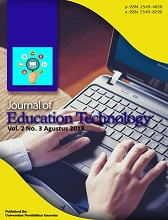Portable Multi Capacitor Discharge Ignition Trainer to Enhance Students Critical Thinking Skills in Vocational High School
DOI:
https://doi.org/10.23887/jet.v8i3.77010Keywords:
Critical Thinking, Ignition Trainer, Multi Capacitor Discharge IgnitionAbstract
The low mastery of critical thinking skills results in students’ inability to interpret, analyze, and apply acquired knowledge. This condition adversely affects the mastery of competencies and decreases the competitiveness of vocational high school graduates. This study aims to develop the portable multi-CDI (Capacitor Discharge Ignition) system practice tool and test its effectiveness in improving students critical thinking skills in the competence of maintaining motorcycle ignition systems. To address the research questions, the study employs the ADDIE model for development research, which commences with needs analysis, solution design, product development, implementation, and evaluation. The discussion in this article is confined to the implementation of the developed trainer to improve students critical thinking abilities. Implementation in learning utilizes a quasi-experimental non-equivalent group pretest-post-test design with control and experimental classes, involving 64 respondents from motorcycle engineering vocational high schools selected by purposive sampling. Paired t-test analysis is utilized to ascertain the effectiveness of the trainer in enhancing critical thinking skills. We conclude that the use of appropriate media and teaching methods can foster unique interaction patterns in cognitive dimension formation. Beginning with identifying disturbances and damages, explaining their causes, implementing repair procedures, analyzing repair outcomes, and evaluating the results of disturbances and damages in the motorcycle ignition system.
Published
How to Cite
Issue
Section
License
Copyright (c) 2024 Eko Marwanto

This work is licensed under a Creative Commons Attribution-ShareAlike 4.0 International License.
Authors who publish with the Journal of Education Technology agree to the following terms:
- Authors retain copyright and grant the journal the right of first publication with the work simultaneously licensed under a Creative Commons Attribution License (CC BY-SA 4.0) that allows others to share the work with an acknowledgment of the work's authorship and initial publication in this journal.
- Authors are able to enter into separate, additional contractual arrangements for the non-exclusive distribution of the journal's published version of the work (e.g., post it to an institutional repository or publish it in a book), with an acknowledgment of its initial publication in this journal.
- Authors are permitted and encouraged to post their work online (e.g., in institutional repositories or on their website) prior to and during the submission process, as it can lead to productive exchanges, as well as earlier and greater citation of published work. (See The Effect of Open Access)

















